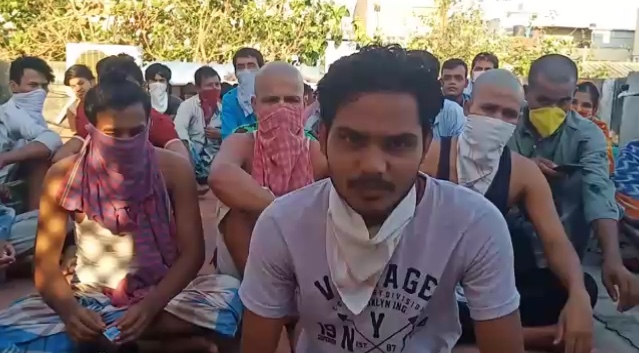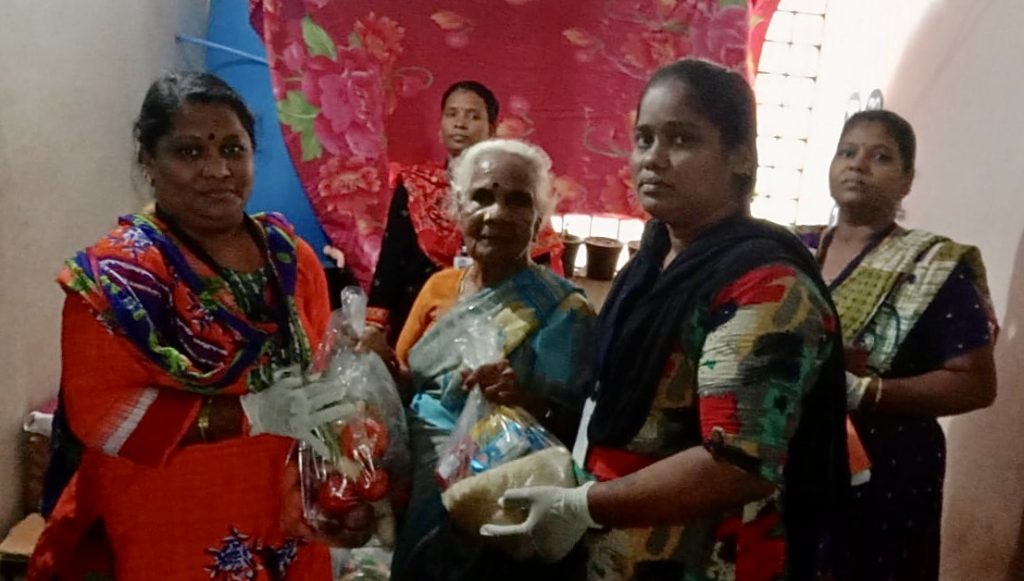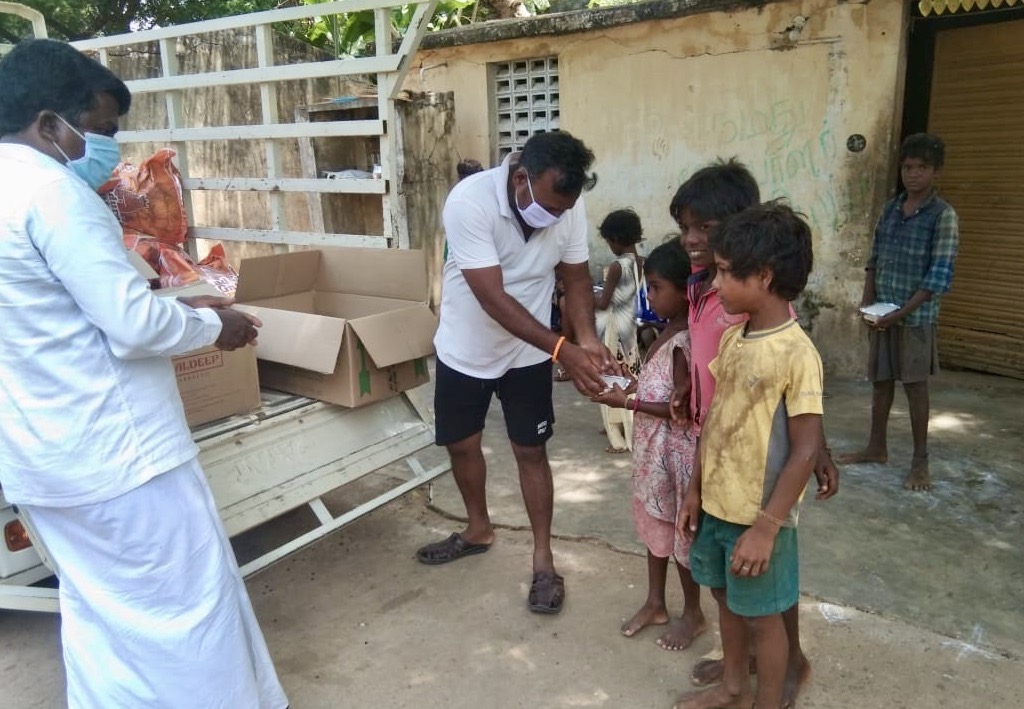It Takes a Village: Helping the Most Vulnerable in Crisis
In response to India’s literal and economic pandemic, a collective made up of community groups and non-profits rapidly stepped in to help, transforming from a small environmental effort to a massive citizen’s movement in just a matter of days.
Thu, Apr 23, 2020
India’s countrywide coronavirus lockdown has also sparked an economic pandemic, with thousands of migrant workers and daily wage earners now stranded across the country. In Chennai, a collective made up of community groups and non-profits rapidly stepped in to help, transforming from a small environmental effort to a massive citizen’s movement in just a matter of days. This is the story of how they did it.
The migrant workers hadn’t seen their families in months. After long stints of construction work in Kerala, where they slept in crowded lodges and earned a low daily wage, coronavirus hit, and all they wanted was to go home. So they boarded a train to Chennai, from where they planned to travel on to their homes in Odisha, Kolkata, and Uttar Pradesh — only to find their onward journey blocked by India’s enforced lockdown. They were stuck in Chennai, without money, food, work, or recourse. The economic impact of COVID-19 was rising by the day, and home had never felt further away.
Help, luckily, came their way. A community taskforce quickly stepped in, led by Save Chennai Beaches and Sumanasa Foundation. They partnered with other nonprofits and alerting the city government’s urban homeless shelters team, providing food and provisions to help sustain them – and many others in similar dire straits, including senior citizens, differently-abled women, and the homeless.
What began as a small community effort to preserve the livelihoods of people living along Chennai’s coast has become, within just three weeks, a massive citizen’s movement that is exemplifying the idea of resilience and collaboration, supporting the most vulnerable members of society through this crisis. Today, 30 days into the lockdown, this initiative has helped provide over 140,000 meals to those who need them most.

It took, as they say, a village—or rather a whole city, according to Krishnamohan Ramachandran, Chennai’s Chief Resilience Officer, who has been part of the core team leading the initiative.
On the strength of word of mouth, a total of 308 donors came together to lay the building blocks of a “resilient recovery program” for Chennai’s coronavirus-induced crisis. Like all great citizen’s movements it required involvement, collaboration and partnership from everyone, across all sectors of society, working hand-in-hand with the government. Nityanand Jayraman, a journalist and environmental activist, joined the effort. So did T.M. Krishna, a beloved classical Canartic singer. And at the center of it all is the community: not only the most visibly-connected, but everyone, including daily wage earners and the homeless.
“What we were able to demonstrate is that if you work with the government to coordinate these activities centrally and implement them locally, you can really help people in need,” Ramachandran said, emphasizing the importance of trust in times of crisis.
“Communities need to trust the government, but the government also needs to trust communities to be able to deliver on the ground.”
Chennai, a city of 8.1. million, is fed by three rivers and cut by numerous canals. More than a quarter of the population live in informal settlements, and they rely on the waterways—and their proximity to the city—for their livelihoods. Some are fishermen and women, while others are small-scale vendors that make a daily wage selling food on Chennai’s beaches: hot coffee, and delicious snacks like channa sundal (chickpeas tossed in mustard seeds, curry leaves and lemon), idli and coconut chutney. When the coronavirus crisis hit and the city locked down, they had nowhere to turn for support.
As part of the initiative, Pudiyador, a Chennai-based non-profit, has been offering emergency relief packages to these street sellers and fisherfolk, as well as rag pickers and domestic workers. “We are so happy to have you call and check on us so many times,” one recipient said in response to the effort. “Even when others are not present, we feel you are there for us.” “A big thank you to all of you who are doing so much for us who have nothing,” said another. “May good things happen to you always.” Others have spoken about how the citizens movement enabled them to take care of their newborn babies and their grandmothers at this time.
Some beneficiaries have even become small-scale donors themselves, offering amounts between $5 and $20 to help support the effort. “I’m very happy to see you people are working with good hearts, so I would like to be a part of this,” said one woman who donated 1000 rupees ($13).

Since its launch just over four weeks ago, the Save Chennai Beaches & Sumanasa Foundation collective has raised more than $34,000 and has reached more than 35,000 people across 130 locations in Chennai. It has supplied more than 32,500kg of dry rations (like potatoes, rice, chickpeas and dal), as well as 1200 kg vegetables, and even 1,200 watermelons (which are currently in season) to homeless shelters and others in need. Through partnerships with various community businesses, it has delivered N95 masks to health workers, given sanitary napkins to low-income women, made meals for transgender persons in need—and, catered food from a bakery transformed into a central kitchen, for people living on the streets.
“The classic definition of resilience is that a community will be able to bounce back after a shock or stress, or even better, bounce forward.”
India’s national lockdown has been extended until May 4. The efforts Save Chennai Beaches and Sumanasa Foundation are taking, he said, show the power that the collaboration and coordination of citizens movements can have in a crisis, and he hopes it can be replicated in the future—whether in a pandemic, a flood, or a drought. “This is why we have documented this effort so meticulously and are advocating for better data to reduce omissions, fragmentation and duplication in relief work.”
And while he is realistic that daily life for the most vulnerable will likely not transform after this is all over, he does hope some perceptions will improve— including, perhaps, more respect for the services that daily wage workers like domestic staff provide. Most middle-income families in Chennai have at least two domestic workers, and with the lockdown they haven’t been able to get to work. “Because they couldn’t attend so suddenly, husbands who’ve never done household chores before have had to sweep the floor, help clean the dishes or water the garden,” he said. “It is a lesson in equality, the dignity of labour and supporting the “invisible” millions whom we take for granted.”
While overseeing the initiative, Ramachandran has found time to deliver food packets himself, and said the most meaningful part of his work has been the opportunity to connect with—and be inspired by—members of his community. “I came across an old man while I was handing out food packets in a locality called Adyar which is about three kilometers from where I live. He came up to me and he looked like he was really starving. I gave him a food pack, and then I asked him, “Do you want another one?” and he just looked at me and said, “No, there are another hundred homeless on the street so please save it for them.” “Here was a man who had literally nothing, living under a flyover, but he was still thinking of others,” he said.

This is a new project from the Atlantic Council’s Adrienne Arsht-Rockefeller Foundation Resilience Center and the Digital Forensic Research Lab.
Share your #ResilienceStories and videos with us at resilience@atlanticcouncil.org and join us in sharing on social media: @atlanticcouncil, @ArshtRock, @DFRLab.